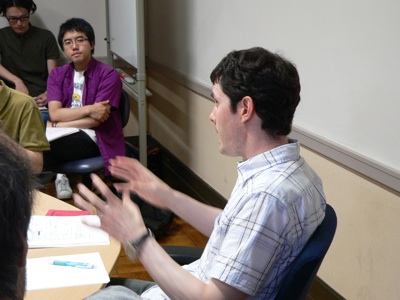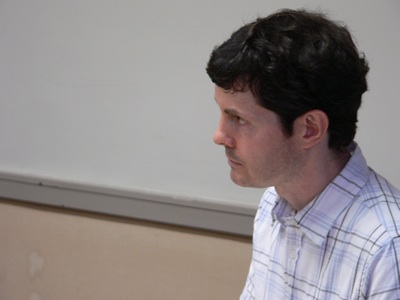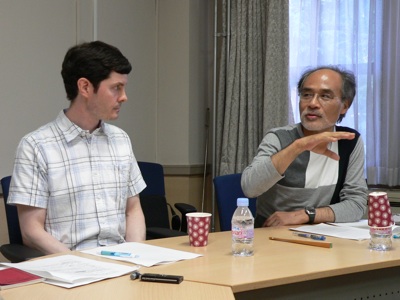[Report] UTCP Lecture "Containing the 'masses': Critiquing Neoliberal Narratives of Equivalence in Japan"
How has neoliberal discourse legitimated itself in Japan? How should we locate it as an historical and cultural phenomenon? What strategies may be fruitful for critiquing it? These are some of the questions addressed by Prof. Richard Reitan in this lecture.

A broad consensus has emerged that the modern industrial powers, whether in Europe, Asia, or North America, witnessed a "neoliberal turn" around 1980. While the theory of neoliberalism offers a way to understand political-economic transformations in the age of globalization, neoliberalism is of course hardly a unitary phenomenon. Just as we may speak of a neoliberalism "with Chinese characteristics", we may also inquire about the particular qualities of the neoliberal turn in Japan. To critically engage with neoliberalism in the context of a nation, and to formulate a basis for its critique, we need to begin with an understanding of its specific historical and cultural dimensions.
Reitan's first proposition is that we consider neoliberalism in relation to Japanese neoconservatism. The advent of neoliberalism in Japan has often been located in the economic policies of the Nakasone administration (1982-87). In parallel, neoconservative discourse in Japan has operated on the plane of national culture, advancing claims for a homogeneous national identity or "spirit", that is rooted in the shared history and traditions of "the Japanese people". Neoconservatives have lobbied for remilitarization, the abolishment of Article Nine of the Constitution, a new emphasis on patriotism, historical revisionism, and so forth. While these two discourses — neoliberal and neoconservative — appear superficially unrelated, Reitan proposes that we consider them as discrete but overlapping phenomena that emerged together and have used similar forms of appeal to legitimate themselves. More specifically, both have invoked what Reitan calls "narratives of equivalence", whether socio-economic or cultural, that seek to obscure the realities of inequality and to function as a controlling force against the mass [taishû].
For Reitan, a good example of such a narrative of equivalence, as well as the overlap between socio-economic and cultural discourse, can be found in the economist Murakami Yasusuke's characterization of Japan as a "middle mass society" [chûkan taishû shakai]. Gaining currency in the mid-1980s, Murakami's argument was that the divide between the middle and lower classes had been effaced by a new "middle mass" that shared comparable levels of affluence. While this argument gained a certain currency during the Nakasone administration, Reitan points out that the underlying empirical data suggested a very different story. The ideological function of the narrative of "middle mass society" was to offer an image of socio-economic equivalence that effaced actual disparities and social conflicts, just as Japan entered a phase of vigorous neoliberal restructuring.

By advancing claims of equivalence and community, the discourse of neoconservatism has worked in an analogous manner. Here, however, the appeals tend to be advanced on the plane of culture, e.g., the uniqueness of Japanese culture, whose unity and putative homogeneity smooth over or eliminate the need to tackle the social issues of exclusion, discrimination, and racism. One important function of these claims has been to displace the problems of social and economic inequality to "other" cultures (i.e., those of the West), to thereby reinforce distinctions between Japanese and "others", as well as a dominant "Japanese culture" that does not include dissenters, Ainu, Burakumin, etc. Reitan argues that these narratives of cultural equivalence work not only to distinguish Japanese from "foreigners" but also to mark off an elevated and homogeneous Japan from the disorder and banality of "mass society". Here, Nishibe Susumu's critique of Japanism as a discursive strategy for containing mass society may be seen as a key example. Reitan's point is that if we think about the functions of these two seemingly distinct discourses — neoliberal and neoconservative — it becomes clear that there is actually an overlap between them.
Another point of overlap or convergence may be seen around the "morality of work". On both economic and cultural planes, an ethic of hard work and self-sacrifice is normalized by re-asserting its tie with traditional values such as "Japanese spirit" [Yamato damashii]. Significantly, this convergence has been mobilized against young people who resist the new economic régime and extension of traditional values, by characterizing them as lazy, irresponsible, parasitic, etc. In this way, the younger generations who resist or refuse to reproduce the social order are positioned as a threat that needs to be regulated. This move to position and regulate the demands of Japanese youth thus serves both neoliberal and neoconservative discourses.

Reitan suggests that these broad narratives of equivalence pose three implications. First, any attempt to critique these narratives must be based upon an historically contextualized understanding of modern Japan, including the significance of discourses on Japanese "spirit" as well as those taking a negative view of mass society. Next, to the extent that neoliberal discourse tends to obscure or efface economic and cultural disparity, a critique must somehow expose this ideological function. Third, there is the matter of the space of critique itself. That is, the place from which critiques of these discourses may be posed. For example, we might ask whether and to what extent the Humanities can serve as a space of critique. For, there is at present a struggle in the system of higher education over the scope of its mission, and over the nature of its institutional and disciplinary boundaries. At stake in this struggle are the distinctions between legitimate and "illegitimate" axes of research.
For example, as universities have been restructured using corporate models of management, neoliberal discourses have penetrated the sphere of higher education, often representing the humanities as "impractical", as loss- rather than profit centers (though analysis suggests in fact the opposite is true). Here, it may be worthwhile to reflect on tactics, asking whether a defensive or reactive position that states the Humanities are indeed "practical" might be, in effect, an acquiescence to the value system underlying neoliberal doctrines. Another problem is that the attacks on the space of critique are also coming from within, as debates on curriculum and canonicity make recourse to forms of elitism, the "Great Books", the universality of Western values, etc. In this sense, neoconservatives within the academy also threaten to undermine the position from which neoliberal discourses may be questioned.
Given the characteristics of neoliberal discourse in Japan, which approach should we pursue in critiquing it? Taking its historical and cultural dimensions into account, Reitan suggests that rather than attempting a positive critique of neoliberalism based upon essentialist claims for social justice, we should instead consider negative, self-reflexive forms that work to reveal its ideological functions. That is, rather than attempting to ground critique in an elaborated definition of social justice, democracy, and so forth, we can allow these concepts to operate as floating signifiers. The presupposition here is that forms of solidarity are possible — and may even depend upon — a greater degree of contingency and ambiguity around certain core concepts or principles. Here, the challenge is in fact to avoid couching this critique in the form of totalizing appeals to an "alternative social order" that is grounded in promises (which cannot be fulfilled) of universal justice.

A lively discussion followed Prof. Reitan's presentation, during which the issues of critique and historicization were explored. Viren Murthy returned to the question of how one historicizes neoliberalism. On his account, our approach to historically situating neoliberal discourse, and the way that we conceptualize links between the global and the local, are also going to affect how we understand the notion of a self-reflexive critique. More broadly, neoliberalism and neoconservatism may be seen as responses to a new type of fragmentation, perhaps one that is occurring at a global scale following a reorganization of capital, and part of that response is the proposition of a kind of fictional unity. The problem with proposing a self-reflexive critique is that it runs the danger of ultimately affirming that fragmentation. The concern here is that unless critique in some way comes to grips with totality, it may not be effective.
Another way to think about this is by locating neoliberalism in the history of theoretical attempts to understand it. It is significant that the broad occultation of Marxism in the 1970s coincides to a certain extent with the appearance of neoliberal social discourse, and as the latter quickly wanes, postmodern theories begin to gain currency. Conspicuously, it is around this moment that Laclau and Mouffe's "Hegemony and Socialist Strategy" was published, offering a "post-Marxist" theory which is, ultimately, unable to make sense of capital. The problem, for Murthy, is that without making sense of capital, without grappling with the question of totality, it may be impossible to really critique neoliberalism. The question, then, is not one of thinking about absolutism versus relativism, but whether our concepts of social justice can be reflexively grounded in the historical present, such that they could pose an alternative to the neoliberal order.
For Reitan, the significant point is that any notion of social justice will finally be multiple. We can ground and historicize these concepts, we can try to understand them in relation to a totality, but there will always be other conceptions of this justice in other parts of the world. Does this imply, then, that is it just power that decides? Indeed, Laclau and Mouffe may come up short from a Marxist standpoint, but the problem remains how to get beyond some essentialized notion of justice, even one that we abstract from our historical conditions.
Another perspective on the history and origins of neoliberal discourse in Japan was offered by Prof. Kobayashi, who noted first that Murakami Yasusuke taught at Todai, and the University of Tokyo was at that time one of the centers for neoliberal thought in Japan. More significantly, though, Kobayashi suggests that in this idea of "middle mass society", we should recall that "mass" [taishû] was a keyword for Marxist thinkers in the 1950s and 60s, in the sense that it was understood as and posited as the subject of revolutionary change. After the 1960s, though, this view of the mass as a subject lost its inertia, and it was in this empty space that a notion like "middle mass society" [chûkan taishû shakai] could appear. In a way, "middle mass society" replaced or came to occupy the absence of the subject of the revolution, or perhaps such a subject came to be understood as no longer necessary, because, of course, the Japanese were said to believe that the vast majority belonged to the middle class. At the same time, just as there was a shift towards the idea that solutions to social or environmental problems would not come from a revolutionary subject, but from society in some more ordinary sense, so too there was the understanding that "middle mass society" was also a fiction or illusion. Here, it is important to reflect on the significance of this image or illusion, especially in relation to the work of Yoshimoto Ryûmei in the 1980s, such as "On High Images" [ハイ・イメージ論] (1989). This was a turning point at which it no longer seemed possible to continue with the former type of Marxist theory, as well as a point at which all of us enter an age in which we become, in a sense, images. Perhaps these images or illusions may henceforth be seen as the motor of history, or as an essential dimension of capital.
— Mark Roberts






